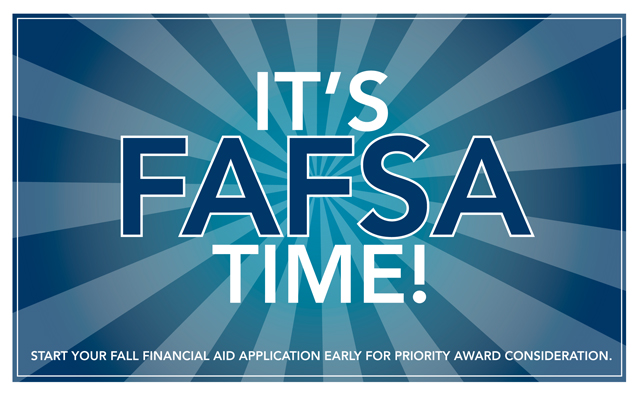"By now, you have likely heard about the FAFSA, or Free Application for Federal Student Aid. I'm going to use this email as an explanation of what the FAFSA is, when to file it, what to have ready, etc.
What it is: "FAFSA stands for Free Application for Federal Student Aid. This form is used to determine the amount of money a family is expected to contribute to the price of attending a postsecondary institution. The results of the FAFSA are used in determining student grants, work study, and loan amounts."
Why it's important: Filing the FAFSA is important, regardless of whether or not you think you will qualify for financial aid. It's well worth your time to do so. After you file the FAFSA, you will receive your formal financial aid offer. It's only then you will know how much your education is going to cost (this is also a reason you should consider waiting to accept an admissions offer until after you receive the financial aid offer if finances are an important part of the equation). The FAFSAalso serves as the paperwork necessary to qualify for federal loans (all students, regardless of income, qualify for loans). The interest rate you will get is way better than the bank.
What should I do first? This year, there is no longer a PIN for the FAFSA; it has been replaced by what is called the FSA ID. The PIN, and now the FSA ID, are how you submit the FAFSA electronically. They serve as your certified digital signature. You can sign up for this now (and I recommend you do so). Both you and your student will need an FSA ID to complete the FAFSA. You can get that set up right now through this link: https://fsaid.ed.gov/npas/index.htm
When can I file the FAFSA? Starting January 1st, you will be able to use that FSA ID to complete the FAFSA. January 1 is the earliest you can complete the form. I recommend doing it as soon after January 1st as possible. You do not need to have filed your taxes to complete the FAFSA, rather, you can use estimated information and update later. The important thing is filing early. If you can get your taxes done before filing, it might make your life a bit easier, but it's not a have to, especially if it is going to delay the filing the FAFSA.
Where do I go to file the FAFSA? This is the link you can use to file the FAFSA starting in January: https://fafsa.ed.gov
What do I need to have ready?
- Your Social Security Number
- Your most recent federal income tax returns, W-2s, and other records of money earned. (Note: You may be able to transfer your federal tax return information into your FAFSA using the IRS Data Retrieval Tool.)
- Bank statements and records of investments (if applicable)
- Records of untaxed income (if applicable)
- An FSA ID to sign electronically.
If you have any questions about how to file the FAFSA, there are numerous free resources out there. I am attaching to this email a super in depth guide put out by a company called Edvisors, which specializes in college financial aid consulting. It's a terrific guide. Attachment can be downloaded here.
For nuanced or unique questions, I would consult the website finaid.org.
One more thing to be aware of with financial aid forms is that there are several colleges, especially private colleges, that require additional forms like the CSS profile or a university specific financial aid form. To check to see if any of your colleges require the CSS Profile (in addition to the FAFSA), you can check this link: https://profileonline.collegeboard.org/prf/PXRemotePartInstitutionServlet/PXRemotePartInstitutionServlet.srv
For every school to which you have applied, you should consult the school's financial aid webpage. Check the deadlines and requirements for each college."

 RSS Feed
RSS Feed
